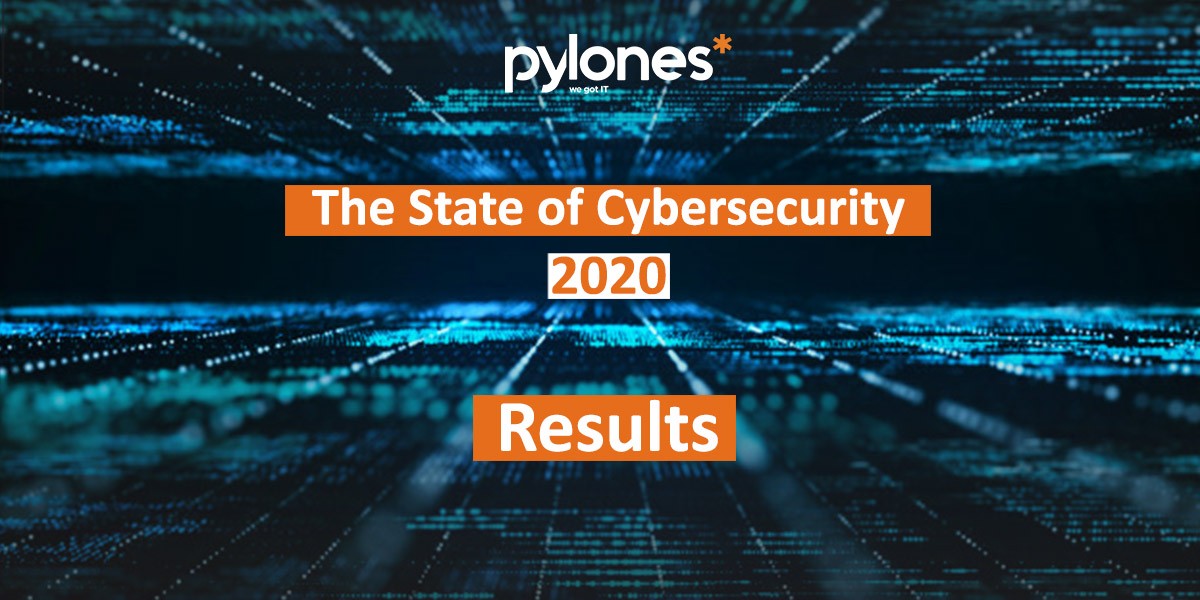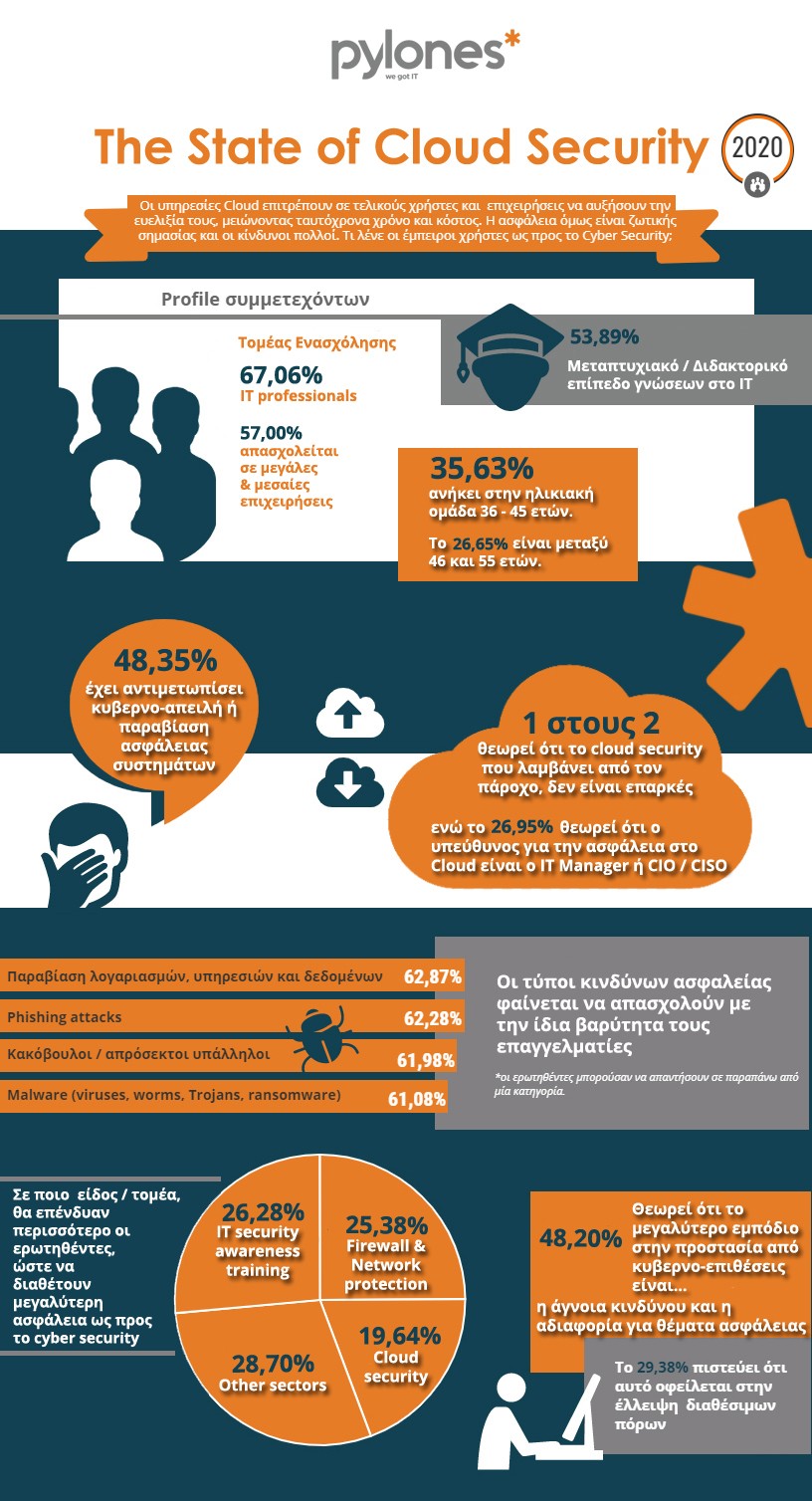
Athens, Greece – 8 October, 2020 –Pylones Hellas, a provider of advanced IT solutions to medium and large enterprises, with presence for more than 22 years in Greece, Cyprus and the wider region of South-eastern Europe as IT systems & security Integrator, announces the results of its first annual security research on cloud computing security.
As part of the effort to continuously and thoroughly understand the conditions prevailing in digital security, Pylones Hellas, created and conducted, in collaboration with the Department of Digital Systems of the University of Piraeus, a major research on cloud computing security.
The research was conducted in the period July-September 2020 between upper management company executives, IT and digital security managers, as well as procurement managers.
The aim of the research “The State of Cloud Security 2020” was to assess the changing sense of security related to cloud computing and to shed a light to the IT decision makers regarding the conditions, the reasons, but also the risks, related to work and cloud security. Cloud services allow end users, but also small businesses and large organizations to increase flexibility and speed up their processes while reducing costs.
“During the Covid-19 pandemic, many businesses and end users turned to cloud services and secure remote access technologies to continue working remotely. However, there are concerns about storage, privacy and data security, as there are security challenges in cyberspace. Who are actually responsible for security? How well do we know the Cloud risks? What are the biggest threats to what we call as Cyber Security?” mr. Emmanuel Netos, General Manager of Pylones Hellas raises the key questions of the research. But what about the conclusions, based on the hundreds of responses from the participating IT professionals?
Participants profile
More than 350 IT professionals and executives participated in the research. 67.06% of the participants in total are in a key position in the IT sector, with 27.84% stating that they are specialized in IT security, while 13.47% are in the field of IT Networking. 25.75% are employed in other branches of IT. Regarding the educational level, 53.89% of the participants hold a postgraduate / doctoral level of knowledge in IT. It is also noteworthy that over 57% of the respondents is employed mainly in large & medium enterprises while a 20% in small & medium enterprises.
Threats & Risks
The most important finding of the research is that the threats and dangers on the Internet concern us all! This comes as result from the 37.54% of the participants who have already faced a cyber threat or cyber security breach without serious problems. However, 10.81% stated that they had serious consequences from cyber-attacks on their systems or data.
It is noteworthy that the types of threats and risks are many and create the same degree of concern to security officers. It is characteristic that in the reflection on which they consider the biggest risk that concerns them, the answers were varied and the percentages were equal! More specifically, the violation of accounts, services and data, phishing attacks, Malware (viruses, worms, Trojans, ransomware) are in the same level of concern for IT professionals. At this point it should be highlighted that on the same scale – according to the answers – are the malicious or careless workers, which is particularly worrying, as a simple mistake can cause great damage.
Apart from that, digital threats are specific and both cloud providers and IT managers focus on defense and security. But is that so? As 48.20% of respondents believe that the biggest obstacle in terms of protection against cyber-attacks is the ignorance of the risk and the negligence of those responsible as well as those who make decisions. In addition to this concern, leads the percentage of 29.38% based on which, it is not possible to properly address the threats due to lack of resources or infrastructure.
Correlated with the conclusion of the problems, ignorance and lack of resources, the executives interviewed, conclude that the primary measure that has to be taken is education (IT security awareness training) at a rate that reaches 26.28%. Respectively, the proposals for bigger investments in Network & Firewall protection 25.38% and Cloud security 19.64% follow.
Cloud & Users
In the current context of the Covid-19 pandemic, the cloud seems to have entered the daily lives of many users and companies. This is also shown by the large percentage of 87.5% of respondents, who stated that they use some form of service / application in the cloud and seem to be familiar with its technology, with 33.6% using a private cloud. 82% state that use a cloud service in their company such as Infrastructure as a Service (IaaS), Software as a Service (SaaS) or Platform as a Service (PaaS).
A significant percentage of executives (64%) state that the company or organization in which they work plans to deploy applications in the cloud within the next 12 months. This finding demonstrates the business recognition of cloud utility. 28% say that the implementation plan will be completed by the end of this year, mainly as a result of the Covid-19 pandemic.
Digital Security & Cloud: Who is responsible and what are the concerns and challenges for cloud security
Given the conclusions regarding the risks, it is important to look at the perspective of digital security and those responsible for it. Who is ultimately responsible for cloud security? Half of the participants, 50%, consider that the cloud security delivered by the provider is not enough This is a finding that the companies that provide these services should focus on and consequently cover the users’ sense of uncertainty regarding cloud security.
The biggest concern regarding the use of cloud services seems to be the lack of skills to understand the impact on security by 51.80%. While a significant percentage of 52.91% declares as the biggest challenge in cloud security the detection and response to security incidents that comes as a result of the lack of visibility in the cloud and ignorance of cloud security.
In conclusion, we can assume that according to the research findings, the field of digital security and especially in cloud, needs training of the technical staff, the users themselves and the management of each company. With many companies continuing to work remotely, education and information are more important than ever.
About Pylones Hellas
Pylones Hellas, member of the Cypriot group P.M.Tseriotis Ltd, is active for more than 20 years in the field of digital technologies and internet security. The company combines the services of both IT systems integrator and IT security integrator, consisting a pioneer IT provider for the Greek market. Based on three significant pillars Security, Optimization and High Availability, Pylones Hellas provides cutting-edge technology solutions, on any scale, in multiple demanding sectors such as Telecommunications, Hotels, Financial institutions and companies that base their business on the Internet, while continuing updating its customers’ Information Technology Infrastructure, to provide, in turn, a high level of digital services to their customers. Strategic partners of Pylones Hellas are F5 Networks, HPE, IBM and Microsoft offering numerous solutions in areas such as security, wired and wireless networks, storage, business critical systems, datacenters and cloud.
For more information please visit: www.pylones.gr | LinkedIn | Facebook Page| YouTube






